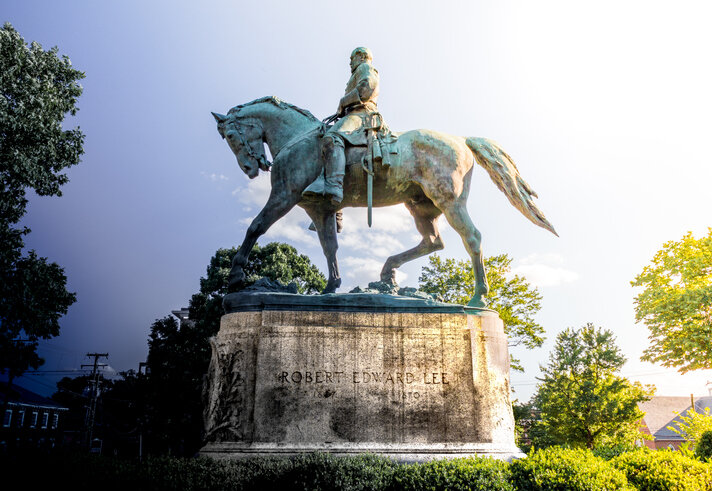There is a difference between cultural memory, the historical record, and the necessary discussion about how past events forge a social reality that fails to be equitable.
For people who have kept current on the events of the past month, the issues of social justice, the revision of history, and the cult of monuments are trending topics in social media today. In this context, the case of George Floyd not only triggered a widespread repudiation of racial violence and protests around the world but also opened once again the debate about the preservation of monuments that might glorify a racist historical past in the United States.
The North American country has not been the first participant in the set of conversations that seek to reassess how the historical record is kept in a nation; in fact, there is a term specifically coined to define this type of debate called the “History Wars.”
The origin of the History Wars
The term “history wars” was coined in Australia to name a series of public debates on the interpretation of the history of British colonization in that country and the development of contemporary Australian society, a reflection on their impact on the Aboriginal Australians and the islanders of the Torres Strait.
The most important point about those debates is how the history of the colonization process was discussed in light of a series of fundamental questions: Who writes history? Who are the historical figures, and why? Which events are highlighted? Do these events help to form a national identity? Does that national identity set the foundation for a social system that discriminates or excludes certain groups or ethnicities?
These questions are fundamental when analyzing why history is told in a certain way and why selected elements of that historical past remain in force in our present, whether in the form of something intangible like a custom, law, or tradition, or tangible, like a monument or statue.
Also, the questions above are central in understanding the conversation in the United States about why the statues and monuments commemorating the life and work of historical figures who pronounced themselves in favor of slavery or racial violence should be preserved.
Are monuments an integral part of history?
The commemorations and references in the cults of history are deeply engraved in global culture. Many streets, schools, and parks have names of historical figures or events, and we can find statues in squares, museums, and public spaces. These tangibles help us to remember and create a personal relationship with our cultural history and identity, but having a tangible historical object with which we can connect is not the same thing as learning history.
The key question when we discuss historical monuments and their differing depiction of past events with the real story is what matters more? The cult of interpretation surrounding people and past events or the critical study of these? In the US, the monuments that are linked to a racist, historical past become a discussion where the point is not the historical facts, nor even how they are recorded, but how people perceive these facts and why they idealize them.
“History will still be taught. We will know who Robert E. Lee was. Who Jefferson Davis was. Who Frederick Douglass was. Who Abraham Lincoln was. There are far more dangerous threats to history. Defunding the humanities, cutting history classes and departments. Those are the real threats to history.”
A statue of Christopher Columbus, for example, would serve to commemorate and perhaps initiate a conversation about an event as relevant as the discovery and colonization of America. However, it would fail to address the complicated legacy of the Genoese explorer or why it is necessary to re-evaluate and reframe the narratives that surround his life and work.
Imagen: Istock/mcdustelroy
Robert E. Lee, Confederate commander of the Northern Virginia Army during the American Civil War, pointed out the reason why monuments that commemorate historical events such as wars, conquests, or the rise of political regimes, can open up long-enduring social gaps. “I think it wiser not to keep open the sores of war but to follow the examples of those nations who endeavored to obliterate the marks of civil strife, to commit to oblivion the feelings engendered,” Lee said, responding to the possibility that a memorial to remember the Battle of Gettysburg might be erected. Through this writing of General Lee, one can appreciate the depth of this maxim that makes a clear distinction between the memory that a monument evokes and the historical record that puts it in context.
Along this line of thought, remembrance is a personal act linked to the perceptions and emotions of an individual. It may have meaning to a person, a family, or a community. Still, it has no place in public spaces, and it is not a substitute or equivalent for the historical record, as Annette Gordon Reed explains to the Harvard Gazette. This United States’ historian of slavery, legal scholar, and member of the Harvard Presidential Initiative on the Legacy of Slavery explained why the removal of monuments did not represent a danger to history. “History will still be taught. We will know who Robert E. Lee was. Who Jefferson Davis was. Who Frederick Douglass was. Who Abraham Lincoln was. There are far more dangerous threats to history. Defunding the humanities, cutting history classes and departments. Those are the real threats to history.”
Gordon Reed’s statement also is clear and final, stating that the right place to talk about history is in the classroom. It is in this space that an open and critical conversation can take place for teaching purposes about the historical record and what its role is in the reality that we have in current times.
There is value in the idea of recalling history, of honoring events and people whose work helped to form our present. Yet, this does not help us to develop an understanding of the historical past nor the lessons we must learn from it; for this, a reliable historical record and teacher who facilitates its critical interpretation are necessary.
Disclaimer: This is an Op-ed article. The viewpoints expressed in this article are the author’s own and do not necessarily reflect the opinions, viewpoints and official policies of Tecnológico de Monterrey.
This article from Observatory of the Institute for the Future of Education may be shared under the terms of the license CC BY-NC-SA 4.0 
)
)



)